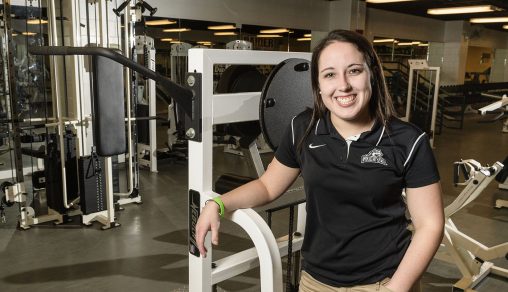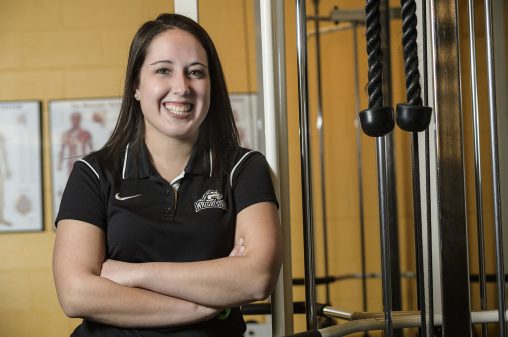
Katelyn Howard, a senior sports science major at Wright State, helps cancer patients with their physical therapy as part of her job at Maple Tree Cancer Alliance. (Photos by Erin Pence)
It was freshman year at Wright State University for Katelyn Howard. She was sitting in class when she heard her health professor say: “Any area in the medical field is about teaching people to live better lives.”
It was a pivotal moment for Howard, who quickly changed her major from biology to sports science with an eye toward physical therapy.
A second classroom moment would propel her to an internship and then a job with Maple Tree Cancer Alliance, a nonprofit that provides free exercise, nutritional guidance and fellowship to people battling cancer.
“Exercise is medicine,” said Howard, who is now a senior. “Physically we’re there to help them get stronger, regain their balance, regain their strength and mobility. But mentally and emotionally is where it goes deeper.”
The Maple Tree Cancer Alliance was founded in 2010 by Karen Wonders, director of the Wright State University Sports Science Program.
At the alliance, Howard went through an extensive training process. After completing a 400-hour internship with the alliance at Soin Medical Center in Beavercreek, she was hired as a full-time employee.
“I’m still taking classes at Wright State, but I also have a patient load of about 25 people,” she said. “All of them are in different stages of their cancer journey. Several have been newly diagnosed, several have undergone surgeries, several are undergoing treatment — chemo or radiation.”
Howard said most of her patients see a drastic increase in strength and endurance after only three months of exercising. That coupled with mental and emotional support sends their confidence soaring, she said.
Howard said some cancer patients arrive at the exercise program in tears, “defeated” by their situations.
“It is devastating; I empathize with that,” she said. “But weeks later they may be able to do the exercises or accomplished something we might take for granted but is a very big deal for them. So we celebrate it. They are so much happier, so much more energetic from what we do.”
Howard grew up in Englewood. Her mother, an alumna of Wright State, is a teacher in the Northmont school district.
At Northmont High School, Howard was voted “Most Involved.” She played soccer all four years and was active in Students Against Destructive Decisions and a host of other organizations.

Katelyn Howard has given campus tours and served on the College of Education and Human Services Dean’s Student Advisory Board, the Wright State chapter of Habitat for Humanity and the ’67 Society.
After graduating in 2015, Howard enrolled at Wright State in part because she felt she would have opportunities to take on leadership roles.
“And I knew I could get a quality education with great experience and come out with little to no debt,” she said. “To me that was a great combination.”
At Wright State, Howard played co-ed basketball and other intramural sports. She was also a campus tour guide for two years.
“Acting as the face and voice of the university was a really great experience,” she said.
Howard is an honors student, with a grade point average north of 3.8. She is also president of the College of Education and Human Services Dean’s Student Advisory Board, president of the campus chapter of Habitat for Humanity and director of philanthropy for the ’67 Society.
Majoring in sports science gave Howard hands-on experience and led to internships.
“I actually did an internship with the NeuroRehab and Balance Center at Southview Medical Center,” she said. “I worked with stroke patients, Parkinson’s patients, Huntington’s patients. At that point I already had quite a bit of shadowing experience.”
Howard also spent a lot of time at the Wright State Physicians Building, where many athletic training classes are held. And she conducts research into arthritis of the knees, exploring how exercise can improve range of motion.
“I learned how important physical therapy is in managing illnesses or doing rehabilitation after a surgical procedure and prehabilitation before a procedure,” she said. “I learned how important the work is in serving the community. The need for it is so high.”
After graduating this May, Howard plans to pursue her doctorate in physical therapy at the University of Dayton.

 Wright State alum Lindsay Aitchison fulfills childhood space-agency dream
Wright State alum Lindsay Aitchison fulfills childhood space-agency dream  Wright State business professor, alumnus honored by regional technology organizations
Wright State business professor, alumnus honored by regional technology organizations  Wright State University Foundation awards 11 Students First Fund projects
Wright State University Foundation awards 11 Students First Fund projects  Gov. DeWine reappoints Board Treasurer Beth Ferris and names student Ella Vaught to Wright State Board of Trustees
Gov. DeWine reappoints Board Treasurer Beth Ferris and names student Ella Vaught to Wright State Board of Trustees  Joe Gruenberg’s 40-Year support for Wright State celebrated with Honorary Alumnus Award
Joe Gruenberg’s 40-Year support for Wright State celebrated with Honorary Alumnus Award 